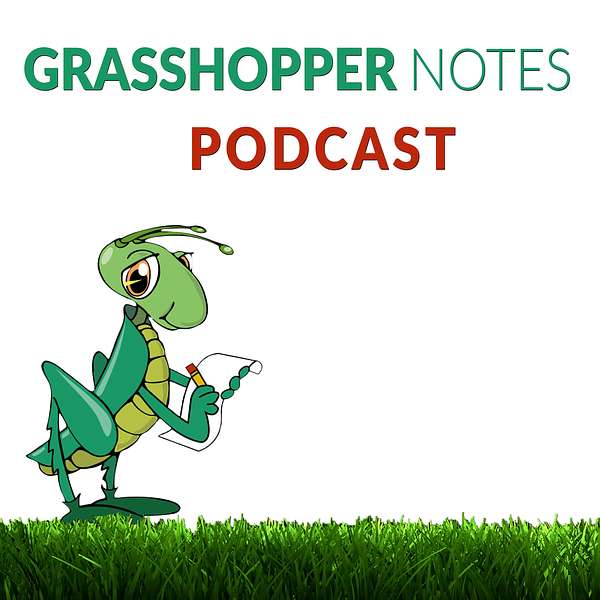
Grasshopper Notes Podcast
The Grasshopper Notes Podcast is hosted by John Morgan the man who has been billed as America’s Best Known Hypnotherapist.
John’s podcasts are a collection of guided meditations and bite-sized, mini podcasts which open you to new ways of thinking, communicating, and responding. You get a finer appreciation of how your mind works and how to use your internal resources to your best advantage.
See a video of John's background at the following link: https://www.youtube.com/watch?v=XbCPd00ok0I
In short, John Morgan is a people helper. Explore this channel and see what he can help you discover.
Grasshopper Notes Podcast
Practice
Use Left/Right to seek, Home/End to jump to start or end. Hold shift to jump forward or backward.
How do you get to Carnegie Hall? is more than an old joke. It's the key to competency.
Grasshopper Notes are the writings from America's Best Known Hypnotherapist John Morgan. His podcasts contain his most responded to essays and blog posts from the past two decades.
Find the written versions of these podcasts on John's podcasting site: https://www.buzzsprout.com/1628038
"The Grasshopper" is the part of you that whispers pearls of wisdom that seem to pop into your mind from out of the blue. John's essays and blog posts are his interpretations of these "Nips of Nectar." Others have labeled his writings as timeless wisdom.
Most of the John's writings revolve around self improvement and self help. They address topics like:
• Mindfulness
• Peace of mind
• Creativity
• How to stay in the present moment
• Spirituality
• Behavior improvement
And stories that transform you to a wider sense of awareness that presents more options. And isn't that what we all want, more options?
John uploads these podcasts on a regular basis. So check back often to hear these podcasts heard around the world. Who wants to be the next person to change?
Make sure to order a copy of John's new book: WISDOM OF THE GRASSHOPPER – 21 Days to Creativity. These mini-meditations take you inside where all your creative resources live. And you'll come out not only refreshed but recommitted to creating your future.
It's only $16.95 and available at BLURB.COM at the link below. https://www.blurb.com/b/10239673-wisd...
Also, download John's FREE book INTER RUPTION: The Magic Key To Lasting Change. It's available at John's website https://GrasshopperNotes.com
Practice
For the most part, I live my life on automatic pilot and so do you. Thank God!
There are so many things that we do that are automated so we don’t have to think about them. It wasn’t always that way. Reminds me of something I learned from my NLP (Neuro-linguistic programming) training . . .
There are four stages of becoming competent at something. They are:
1. Unconsciously incompetent
2. Consciously incompetent
3. Consciously competent
4. Unconsciously competent
Here’s an example: When learning to tie your shoes, you had no experience with shoe tying, and it appeared foreign to you. You were unconsciously incompetent—no experience in the files.
After observing your model (e.g., parent ) tie his or her shoes or your shoes for you and encouraging you to make the attempt, you found yourself to be consciously incompetent—the specific motor skills had not yet developed.
Then came that glorious day when you could do it all by yourself. It took all your conscious attention to get it done. You could now do it. That’s conscious competence.
Finally, you evolved to the point where you could direct your conscious attention elsewhere while simultaneously tying your shoe. That’s when it becomes part of us. We are then unconsciously competent. It’s now patterned behavior. We now own that ability or talent. You are now fully able to tie your shoes with the best of them.
These sub-routines, known as patterns, can make life so much easier.
Patterns can also lull us to sleep, causing us not to notice.
It’s useful to take inventory of our patterns from time to time to see which ones are working and which ones keep us stuck in gear. It’s great that we can tie our shoes without thinking, but how useful is it to paint ourselves into the same corner time after time by running the same routine?
Here’s what these two different patterns have in common. We had to practice them both for them to become routine. One serves us well; the other gets in our way.
The same element that made a counter-productive pattern a routine is the same element we need to outgrow it – Practice.
We would be well served to practice interruption. Interruption keeps stimulus and response from staying in contact. When you notice a pattern and interrupt it, you have momentarily caused the automatic connection to associated behavior to become temporarily suspended. Interrupting something once is interesting; practicing it over and over becomes transformative.
Ask any accomplished musician and they will tell you there is no substitute for practice. Look at anyone at the top of their game and you will find the common denominator of practice. Practice is what takes someone who has a lot of potential and makes them into a household word. Practicing interruption is the key element in outgrowing a pattern that’s on automatic pilot – one that’s flying you into the mountainside every time.
The financial whizes tell us we’ll never be wealthy until we learn to save, and my experience suggests you’ll never grow up ’til you learn to interrupt.
When you interrupt automatic behavior, you create a space between the stimulus and response. It’s from this space that new patterns emerge, take hold and grow. It simply takes practice.
Finally, I won’t ask you how to get to Carnegie Hall. You already know the answer.
All the best,
John
